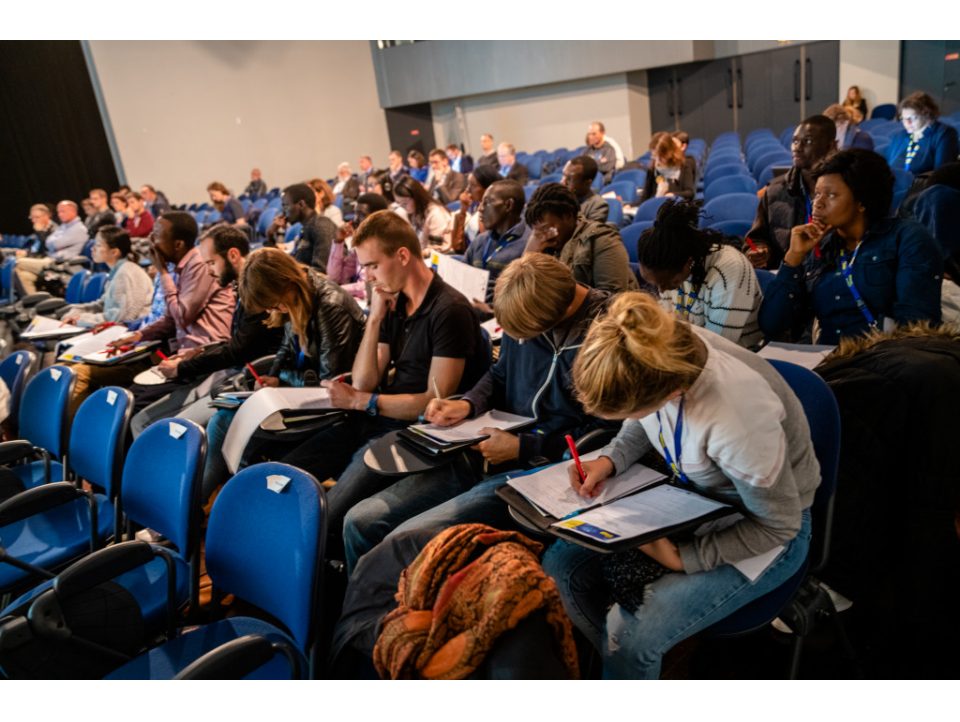Discover the Sea Tech Week conference programme - List of parallel sessions
List of sessions
Last update: June 23rd
Monday 26th September 2022
- Adapt to climate change
Convenor: CEREMA (France)
- Sustainable polymer materials for marine applications
Convenor: IFREMER (France)
- TIGER Supply Chain Series 2: Tidal stream energy growth in the Channel area and Supply Chain requirements,
Convenor: TIGER project
- AI in Meteorology and Oceanography
Convenors: IMT Atlantique (France) and RIKEN (Japan)
- Lower environmental impact for the new research vessel of FOF
Convenor: IFREMER (France)
- What does the IMO e-Navigation S-100 bring to maritime transport?
Convenor: Shom (France)
- Indo-french cooperation in marine sciences: opportunities and mechanisms
Convenor: French Institute in India, French Embassy in India and CNRS India
TUESDAY 27th SEPTEMBER 2022
- Latest innovations for tomorrow's greener and smarter maritime transport
Convenor: Pôle Mer Bretagne Atlantique (France)
- Marine Litter: Solutions for Monitoring, Mitigation and Prevention
Convenors: IEEE-OES and Laboratory for Ocean Physics and Satellite remote sensing (LOPS) (France)
- Navigation and control of Underwater vehicles
Convenors: Indian Institute of Technology (IIT) Goa (India) and National Institute of Technology Silchar (India)
- Opportunities offered by Hydrogene in the maritime world
Convenor: Bretagne Développement Innovation (BDI) (France)
- New fuels: behavior in aquatic environments and responses to accidental spills
Convenor: CEDRE (France)
- Underwater noises: Understanding and Preventing it
Convenors: IEEE OES France Chapter (France), Technopole Maritime du Québec (Canada) and Institut France-Québec Maritime (France-Canada)
- Wind Propulsion: Blending regional initiatives, national developments, and international networks for sustainable shipping
Convenors: International Wind Ship Association and Bretagne Développement Innovation (BDI) (France)
- Greener maritime transports (French-Norwegian session)
Convenors: Innovation Norway, Chambre de commerce France-Norvégienne and Ambassade Royale de Norvège en France
- Highly-efficient innovative water-based Sea Water Air Conditioning solutions
- Convenor: EuroSwac Project (UK); Host: ENSTA Bretagne

- Towards the definition of port ecology and ecological port
Convenor: Institut France-Québec Maritime (France-Canada)
WEDNESDAY 28th September 2022
- Enabling Net-Zero through 5G at Sea
Convenor: JET Engineering System Solutions (UK)
- Esprit de Velox : one small step for seaman, one giant leap for mankind’s maritime impact
Convenors: Esprit de Velox (France) and Bureau Veritas Marine&Offshore (France)
- France India Workshop on Ocean Technology towards advanced Knowledge and sustainable Development
Convenors: IFREMER (France) and India national institute of ocean technology (NIOT) (India)
- HNS Spill prevention: study, inform and train
Convenor: CEDRE (France)
- "Less is more" - Sea Tech as a tool to unlock the full potential of the maritime industry in Small Island Developing Countries
Convenor: Sustainable Sea Transport Initiative (SSTI) (Fidji)
- Crédit Agricole Corporate Investment Bank - Maritime and offshore financing
Convenors: CACIB: Crédit Agricole Corporate and Investment Bank (France)
- Distributing hydrogen from offshore wind farms as a fuel for ships
Convenor: France Energies Marines (France)
- Sedimentary environments and human activities: Management of dredged sediments, extraction of aggregates, marine renewable energy and sustainable ports
Convenor: Ifremer (France)
Joint session with the French Congress of Sedimentology
THURSDAY 29th September 2022
- Challenges of increasing traffic at the poles: Antarctic/Arctic
Convenors: UMR Amure/IUEM (France) and Institut Polaire Français (IPEV) (France)
- Technical innovations to reconciliate marine transportation and ecosystems
Convenors: Office Français de la Biodiversité (France), ISYEB, MNHN and LETG, UBO (France)
- Smarter, greener, cyber: why cybersecurity is vital for maritime transport
Convenor: FRANCE CYBER MARITIME (France)
- The Concarneau meeting “Where industry meets science in marine biotechnology”
Convenor: MNHN Concarneau (France)
- Corrosion monitoring of concrete infrastructures in marine environment
Convenors: LabSTICC (France) and French Corrosion Institute (France)
- University of Plymouth's collaborative projects on Marine Cyber and Decarbonisation
Convenor: UNIVERSITY OF PLYMOUTH (UK)
FRIDAY 30th September 2022
- The Concarneau meeting “Where industry meets science in marine biotechnology”
Convenor: MNHN Concarneau (France)
The topics
Details of the sessions
 Adaptation to Climate Change and environmental transition
Adaptation to Climate Change and environmental transition- Adapt to climate change
Convenor: CEREMA (France)
The effects of global warming on the coastline, ports and estuaries are already visible and are likely to increase if we do not react in measures to mitigate greenhouse gas emissions. Beyond climate change mitigation actions, territories as well as infrastructure managers and service providers will have to adapt to climate change, and sometimes, locally, in a way that is disruptive compared to what has been done until now.The environmental transition of transport is an essential point in the mitigation of greenhouse gas emissions, because transport is the first concerned by gas emissions. This concerns both ports and inland waterways. Innovative solutions using new modes of propulsion or the use of data to reduce journeys are being studied.
- "Less is more" - Sea Tech as a tool to unlock the full potential of the maritime industry in Small Island Developing Countries
Convenor: Sustainable Sea Transport Initiative (SSTI) (Fidji)
Technology has a major role to play for the maritime transportation sector to unlock its full development potential while achieving zero carbon emission by 2050. However, in developing countries, all-tech or high-tech solutions are not always accessible or implementable on a sufficient scale to have an impact.This is especially true in Small Islands Developing States (SIDS), often situated away from the global supply chains and far from large R&D centers, and where local economies struggle to fund innovative solutions. As a result, innovation can can sometime take different forms than in more developed economy – for example through "low-tech" innovation.
SIDS, especially in the Pacific region, are also often referred to as “Large Oceanic Nations” to highlight the importance of the Blue Economy to their development. In that context, opportunities for the private and academic sectors to contribute to a thriving maritime cluster are plentiful, if the specific context is fully taken into account. Among other challenges, solutions implemented in these countries must ensure that the tech used, 1) is locally available and accessible and can be easily maintained; 2) can be integrated into, and contribute to strengthen the local supply chains; 3) “do no harm”, i.e. do not negatively impact the environment or the social fabric when considered in their full-life cycle.
What materials to favour in boat building for small and medium domestic transport (e.g. new resins or new eco-fibers)? Can latest developments in boat designs be translated to developing contexts (e.g. high-performance sailing vessels, multi-hull, foiling vessels)? What room for solar and electric propulsion (how to ensure supply and accessibility)? How can IT be best used to unlock economic and development potential for domestic transport (development of specific user interface, payment applications)? How can international collaboration contribute to increase access to funds, technology and training in developing nations (public seeds funds, private accelerators)? These are among the questions that can be raised.
This session aims at exploring the deployment of "Sea Tech" in the context of developing countries; at identifying what concrete innovations (accross high-tech or low-tech possibilities) can be targeted in priority to leverage the development of a viable sustainable sea transport industry in SIDS; and envision the development of a network of private sector operators, R&D specialists, academics, civil society reps interested in strengthening access to Sea Tech in island nations.
Target participants and audience are Sea Tech companies interested in expanding their business to developing markets; academia, especially researchers in applied science working at innovative solutions that are specially designed for developing environments; CSOs and business networks; private and public organizations providing funding to business innovation, esp. in a development context; international development professionals, etc.
- Latest innovations for tomorrow's greener and smarter maritime transport
Convenor: Pôle Mer Bretagne Atlantique (France)
Pôle Mer Bretagne Atlantique is a French cluster dedicated to maritime innovation including those related to maritime transport. Among its membership, several key players are developing products and services that will participate to tomorrow's greener and smarter maritime transport. This session will present some of these projects and initiatives.
 France-India collaboration
France-India collaboration- France India Workshop on Ocean Technology towards advanced Knowledge and sustainable Development
Convenor: IFREMER (France) and India national institute of ocean technology (NIOT) (India)
A session gathering scientists and engineers from France and India to discuss avenues for cooperation in marine science and technologies, echoing the bilateral roadmap on the blue economy and ocean governance which has been established in the wake of the French government’s Indopacific strategy and the government of India’s Deep Ocean Mission program.
Topics : Underwater Vehicles and Marine Instrumentation (including sensors, instruments/tools, systems for ocean exploration) ; Ocean Observation Platforms and Data Acquisition (focus on deep sea extreme environments) ; Marine Renewable Energy Technologies ; Technologies for Coastal Zone Management.
-
Indo-french cooperation in marine sciences: opportunities an mechanisms
Convenor: French Institute in India, French Embassy in India and CNRS India
In the current global village-like scenario, the societal challenges including health issues, demographic change, climate change, need for clean and efficient energy, smart and integrated transport, food security, and the bio-based economy, are all global. Addressing these challenges warrants answers that are also ought to be global and more importantly, there is a need for urgent solutions.
A significant increase in the global population over the recent decades, extreme industrialization, and increasing human wealth are exerting unprecedented burden on the ocean. Climate change, non-sustainable resource exploitation, pollution, and habitat degradation are leading to a rapid deterioration of good health and sustainable productivity of ocean. India and France both have an enormous coastline and the two nations are highly committed towards appropriate preservation of the marine environment with an objective of a sustainable development approach to coastal resources.
In this context, research in Marine Sciences is critical and will also contribute towards Blue Economy strategies outlines by both the governments. Indeed, both countries have put forward intentions of strengthening scientific cooperation. An efficient bilateral cooperation providing a link between basic research and industrial application is an absolute necessity to address these tasks. In the proposed session/workshop we will discuss the initiatives that the French and Indian government offer to consolidate the scientific cooperation to address the challenges in Marine Sciences, including the contribution of research organizations such as CNRS, Ifremer, IRD, CSIR, DST, DBT or MoES.
 new fuels including Hydrogen
new fuels including Hydrogen- Opportunities offered by Hydrogene in the maritime world
Convenor: Bretagne Développement Innovation (BDI) (France)
Maritime and port territorial loops for renewable hydrogen:> Focus on Hylias project
> Focus on Transrade project (Lorient)
> H2 Production with MRE energy (wave energy to H2 on port infrastructures for local needs)Building Hydrogen ship in Britain: it’s already today:
> Presentation of CBS’s Ships
> Reffited boat: Focus on Porrima & Energy Observer
- New fuels: behavior in aquatic environments and responses to accidental spills
Convenor: CEDRE (France)
Synthesis of the behavior in aquatic environment and the risks in terms of transport by sea of new fuels (Ammonia; LSFO: Low Sulphur Fuel Oil; VLSFO: Very Low Sulphur Fuel Oil ; ULSFO: Ultra-Low Sulphur Fuel Oil ; HVO: Hydrotated Vegetable Oil ; LNG: liquefied natural gas ; Etc. ...), whether they are used for the propulsion of ships or for the supply of distribution plants. Presentation of the European IMAROS project (new generation of LSFO).
- Distributing hydrogen from offshore wind farms as a fuel for ships
Convenor: France Energies Marines (France)
There is a global interest for hydrogen as a complementary energy medium for industrial and mobility applications. In the offshore sector, coupling between wind farms and hydrogen production units is under active consideration. One key aspect of the on-going reflections is the production and distribution of hydrogen at sea. Offshore distribution of renewable hydrogen or ammonia, close to their production area, could be a great opportunity both for the wind industry and the shipping industry, optimising the supply of green energy for maritime transport. The purpose of this panel discussion is to explore the mutual benefits and challenges for the set-up of a network of offshore renewable hydrogen/ammonia filling stations.
 Wind propulsion
Wind propulsion-
Wind Propulsion: Blending regional initiatives, national developments, and international networks for sustainable shipping
Convenor: International Wind Ship Association and Bretagne Développement Innovation (BDI) (France)
Reemergence of wind propulsion as a major technology development in 21st shipping / workshop for a concrete shared pathway with India. Wind propulsion has a significant air and noise pollution reduction impact, carbon and other associated toxic emissions, noise from cavitation and machinery onboard. There are three key trends developing within the sector:
> Tweaking: The retrofitting of existing vessels with wind propulsion systems to reduce fuel use up to 30% and to extend the carbon budget available to shipping.
> Transition: Natural replacement with wind optimised wind-assist & primary wind vessels + operation adjustments to maximise the wind energy component.
> Transformation: Accelerated replacement of existing vessels with primary wind vessels and the uptake 100% energy autonomous wind vessels and even ‘carbon positive’ vessels that are generating significant alternative fuel available for shore based usage.
These trends are at different stages of development; however they hold various levels of promise across numerous SDG objectives especially in the smaller vessel segments with the return of fuel costs into local economies, the opportunities to revitalise smaller ports, reduce pressure on fisheries and revitalise local shipping services and employment.Blending regional ecosystems, national development and international networks has the potential to fuel wind propulsion takeoff and to help building a really decarbonised shipping. This is the vision we are trying to put into action with the International Windship Association, the French Wind Ship Association, Bretagne Developpement Innovation and the "Région Bretagne". Local communities of industrial groups, start-ups, ports, local government, academics and civil society driven by IWSA, IWSA hub, and BDI are part of a French, European and global network of wind propulsion ecosystems of innovators and enablers.
This is leading to a reemergence of wind propulsion as a major technology development in 21st shipping that should be shared worlwide: the Sea Tech Week session is a concrete workshop to creating a pathway with India and beyond.The session will be organised of plenary sessions, workshops and feebacks to create a Country & Regional Map for Shipping in India fit for a decarbonised shipping world with wind propulsion at the heart of the decarbonisation pathway. Creates impact analysis of changes to shipping at local, regional and international level.
 Boat and AUV design and engineering
Boat and AUV design and engineering- Decarbonization of maritime transports; French-Norwegian session
Convenor: Innovation Norway, Chambre de commerce France-Norvégienne and Ambassade Royale de Norvège en France
We want to present the newest solutions, trends and discuss opportunities for bilateral cooperation and funding mechanisms of innovative projects, also within EU frame. Main topics to be addressed: battery-powered, hydrogen, ammonia, hybrid, retrofit...
- Esprit de Velox : one small step for seaman, one giant leap for mankind’s maritime impact
Convenor: Esprit de Velox (France) and Bureau Veritas Marine&Offshore (France)
Endorsed by the UN Decade of Ocean Science, Esprit de Velox is a Responsible Research and Innovation programme that crosses the scientific world’s requirement and the vision carried out by the companies engaged in the maritime ecological transition.
> 30 crucial years for climate and biodiversity,
> Emerging of the Ocean's key role in the metamorphosis of the Earth system,
> Shared need for an exemplary scientific presence at sea,
> Need to collect clean data and produce interdisciplinary knowledge from the vessel itself.
These are both the observations and ambitions that are guiding an extraordinary path to the 70-metre ocean-going, positive impact vessel, designed to embark 50 people on board for transdisciplinary research campaigns from pole to pole, on the front line of climate and biodiversity.
- Navigation and control of Underwater vehicles
Convenor: Indian Institute of Technology (IIT) Goa (India) and National Institute of Technology Silchar (India)
In the recent years, research on navigation and control of Autonomous Underwater Vehicles (AUVs) has become challenging for scientific and economic reasons in view of their several applications e.g. deep-sea operations, off-shore installations inspection, mapping of sea floor, environmental data gathering and sampling, and defence.This special session is intended to invite research contributions made by peers actively involved in navigation and control of AUVs addressing issues such as communication constraints in acoustic medium, uncertainties and disturbances. In the last decade, the new area of research has emerged related to cooperative control between several marine vehicles and heterogeneous marine vehicles.
- Lower environmental impact for the new research vessel of FOF
Convenor: IFREMER (France)
The new regional vessel of the French Oceanographic Fleet will be the subject of an ambitious eco-design approach based on in-depth reflection on the stages of a campaign and their impact, and the choice of adjusted technical solutions, aimed at reducing its overall environmental footprint over its entire life.
The construction of the vessel should be carried out with a limited environmental impact. An open and modular design and the choice of innovative solutions will aim to operate the vessel with a reduction in CO2 emissions of up to 60%, with a minimum commitment of 30% reduction compared to the current situation of a vessel of the same size. To achieve this, this vessel will aim to be a "low consumption" vessel, as well as the optimisation of the ship's operation.
 Materials
Materials- Corrosion monitoring of concrete infrastructures in marine environment
Convenor: LabSTICC (France) and French Corrosion Institute (France)
This session organized by the labSTICC laboratory and the French Corrosion Institute focus on structural health monitoring (SHM) methods and related technologies applied to corrosion and degradation of reinforced concrete infrastructures in marine environment. Experts from all around the world are invited to discuss the latest achievements, from the sensing methods to their deployment in field through smart solutions. This will be an unique opportunity for port and public authorities, companies and academic institutions to imagine innovative solutions. Applications are associated with, but not restricted to, coastal and offshore concrete infrastructures such as port, nuclear plants, bridges, platform, wind turbine, etc.
- Sustainable polymer materials for marine applications
Convenor: IFREMER (France)
This session will discuss the current status and future prospects of replacing current marine materials, particularly polymers and composites, with more sustainable alternatives. Two aspects will be discussed:> First, the options for reducing environmental impact of structures such as floating vessels and their equipment, (boats, ships, buoys, fishing gear…), which can be recovered at the end of their service life, will be presented. In this case the choice of improvements includes thermoplastic composites which can be recycled and biosourced polymers and fibres which have lower footprints and can be composted.
> A second set of applications concerns structures which either risk accidental loss or are deliberately abandoned after service. In this case the ideal material will be completely biodegradable and leave no trace, and the options are more limited. The session welcomes contributions on both aspects.
 Pollution
Pollution- HNS Spill prevention: study, inform and train
Convenor: CEDRE (France)
The maritime traffic of Hazardous and Potentially Hazardous Substances is constantly increasing. In order to better understand the risks in case of accidental spills, we will describe this traffic and then focus on the chemical substances that are transported in liquid form and evaporate in case of a spill at sea. The authorities in charge of the response must then face a toxic cloud, potentially explosive, risking to reach the civilian population. The session will present different preparation tools: a synthesis of work on the behavior of HNS in the aquatic environment (behavioral modeling, laboratory analysis and floating cell tests), presentation of results following the captations by hyper spectral camera) and training tools (e-learning modules, chemical operational guides, etc).
- Marine Litter: Solutions for Monitoring, Mitigation and Prevention
Convenor: IEEE-OES and Laboratory for Ocean Physics and Satellite remote sensing (LOPS) (France)
While quantitative information on production and use of plastics is to some extent available, the amount and fate of plastics discarded or leaked into the environment is highly uncertain. In particular, knowledge of how much plastics, at different scales down to micro and nano levels, reaches the ocean and the pathways and fate of such plastic in the ocean remain poorly known.A focus is needed on how science and technology could quantify the pervasiveness of marine pollution and facilitate an understanding of the mitigating impact of reducing the stock of plastics in the ocean. The goals for meeting such a challenge go through the determination of a strategy for monitoring marine litter in the ocean and develop solutions for addressing the problem.
[Discover the full programme of the session]
- Underwater noises: Understanding and Preventing it
Convenor: IEEE OES France Chapter (France), Technopole Maritime du Québec (Canada) and Institut France-Québec Maritime (France-Canada)
In the past hundred years, the anthropogenic noise introduced into the marine environment has reached unprecedented levels. Effects of shipping noise on individuals and populations range from communication masking, behavioural disturbance. Production of stress hormones, etc. which consequently negatively affect both the animal individual fitness and population dynamics.The purpose of this session concerns, on the one hand, all the systems or methods enable to prevent or reduce the pressure of shipping Underwater Radiated Noise (URN) on the marine environment and, on the other hand, all the methods allowing the quantification of the URN level. The latest advances in marine acoustics research will be presented: passive and active acoustics, impacts of anthropogenic noise on marine organisms (from invertebrates to marine mammals) and also at ecosystem level. Various stakeholders will be likely to participate in this session: researchers, manager of natural environments, public decision makers, entrepreneurs, shipping companies, etc.
 Maritime transport and ecosystems
Maritime transport and ecosystems- Technical innovations to reconciliate marine transportation and ecosystems
Convenor: Office Français de la Biodiversité (France), ISYEB, MNHN and LETG, UBO (France)
Marine transportation affects ecosystems through many processes: disturbance from underwater noise, collisions with animals, chemical contamination from hulls, engines or ballast water, atmospheric pollution from exhaust gaz, dissemination of non-indigenous species, etc. This session will highlight ongoing efforts to develop, test and promote solutions to reduce these pressures to levels that do not threat the marine ecosystem health as a whole. Technological devices, environmental monitoring and practical changes will be addressed, in order to draw an international state-of-the-art of the most promising solutions to achieve the ecological transition of shipping in the very next years.
Focus on Marine traffic - cetaceans interactions: Collisions with ships have become an important threat for cetaceans. The growing trends of marine traffic worldwide reinforces this concern. Large whales such as fin whales (Balaenoptera physalus), humpback whales (Megaptera novaeangliae) and NA right whales (Eubalaena glacialis) are particularly susceptible but smaller species are also impacted. Lethal encounters occur mainly with large vessels such as cargos, while smaller vessels can be responsible of trauma, cut and amputations. Speed of the vessels is particularly important. Identifying areas of strong interaction between ships and cetaceans, estimating the actual mortality magnitudes and thinking about mitigations measures are main points of present studies, and reflection.
- Les Rendez-Vous de Concarneau: Where Industry meets Science in marine biotechnology
Convenor: MNHN Concarneau (France)
The international symposium « Les Rendez-Vous de Concarneau » takes place every two years at the Concarneau Marine Station. It is intended to be part of a continuum between the fundamental research developped within the laboratories concerned and the applications of this research in marine biotechnologies. The symposium brings together a group of experts from the world of fundamental and applied research and industrials with a link to the maritime field with multidisciplinary and complementary skills in biology (molecular biology, microbiology), embryology, ecology, ecophysiology, plant science and aquaculture.
For this 2022 edition, the main theme is Bio-inspiration. We will focused on biomimetics on maritime transport during the session on Thursday 29 September as part of the Sea Tech Week at Brest: « Les Rendez-Vous de Concarneau invite themselves to Brest ». The 12th edition of the « Rendez-Vous de Concarneau » will be held on Friday 30 September at the Marine Biological Station of Concarneau. The meeting at Concarneau will be focused on biomaterials and bioadhesives with a visit to a structure with a bioinspiration project in Concarneau.
 Poles and maritime routes
Poles and maritime routes- Challenges of increasing traffic at the poles: Antarctic/Arctic
Convenor: UMR Amure/IUEM (France) and Institut Polaire Français (IPEV) (France)
Polar navigation is inherently risky. Antarctica and the Arctic are subject to intensifying maritime traffic. More numerous and bigger ships cruise the area: scientific research vessels, state ships, freight ships, fishing vessels and cruise ships. Traffic intensification in polar waters increases the risk of incidents and accidents, endangering passengers and crews as well as threatening the fragile natural environment. This calls for strategic risk management of human safety as well and environmental protection.
- What does the IMO e-Navigation S-100 bring to maritime transport?
Convenor: Shom (France)
Maritime transport is facing key challenges: densification of traffic, port congestion, cyber security threats, digital and ecological transitions. Environmental data combined with new technologies are the source of new services that will partly address these challenges.
The IHO "S-100" standard is the new standard describing the environment for digital navigation, adopted by the International Maritime Organization. It is considered as a digital revolution in the maritime sector, providing answers to both the challenges of modern e-navigation and the sustainable development of maritime activities.
As part of the S-100 implementation decade (2020-2030), this session is dedicated to innovations brought by digital data and services to navigation and maritime transport. Accessible and interoperable data is supporting informed decisions. Collecting and sharing large amount of data, including real-time data, is also a challenge for hydrographic services, ports and maritime companies. Standardization is vital to ensure integrity and usability of these data. Academic research and industry will keep playing a key role in the development of future intelligent systems, on board of ships and ashore, towards a safer navigation, more efficient and more concerned with the preservation of the marine environment.
This session is an opportunity to debate around important questions in this fast-moving environment, including:
• What innovations does the S-100 data service standard support?
• How can we use digital environmental data and technologies to support maritime transport safely co-existing with all other maritime activities?
• As a new standard, its adoption at the international level requires a coordinated cooperative effort. How can we contribute to this?
 Ports
Ports- Towards the definition of port ecology and ecological port
Convenor: Institut France-Québec Maritime (France-Canada)
The confrontation between maritime transport and ecological transition raises colossal challenges. It questions both the technical system, able to respond to environmental issues, and the capacity of the socio-system to initiate adaptation dynamics. If the ship is often at the heart of the reflections to engage this green revolution of shipping, the role of the port in this transition appears more difficult to apprehend. Commercial ports, as interface spaces, offer ecology a system of flows that is complex to grasp as a whole. The port metabolism therefore calls for a necessarily interdisciplinary approach that this session intends to highlight.
- Highly-efficient innovative water-based Sea Water Air Conditioning solutions
Convenor: EuroSwac Project (UK); Host: ENSTA Bretagne
SWAC (Sea Water Air Conditioning) at a glance: It is a technology based on thermodynamics principles using the hydrographic system. It is made to produce thermal energy dedicated to buildings (air conditioning heat/climatization, hot water) or for industrial processes (cold rooms, drying, ice production, etc.).
While the need for cooling in coastal regions and ports is increasing, cooling is still mainly produced through chillers, a technology using large amounts of electricity generated partially by fossil fuels, slowing down the ability to meet EU energy-climate objectives. Sea Water Air Conditioning cooling technology requires often to work closely with the maritime industry to develop innovation technology aspects such as self-burying system, flexible pipe concept, corrosion potential, and temperature data logger, etc.
-
Sedimentary environments and human activities: Management of dredged sediments, extraction of aggregates, marine renewable energy and sustainable ports
Convenor: Ifremer (France)
Joint session with the French Congress of Sedimentology
Maritime transport and, more broadly, human activities at sea and on land generate pollution and nuisances in the marine environment and on the coast that need to be controlled: discharges from activities in the catchment area, discharges from maritime and port activities (dredging, careening, maritime traffic, ...), accidental pollution, disturbance of habitats, etc. The objective of this session is to present different actions, such as those carried out by Cerema or Ifremer, in the framework of its missions to support the implementation of environmental public policies in port and coastal areas.
Experts from the various sectors will be able to present: 1) the ecological transition of activities and actions to reduce pollution/impacts (e.g. port greening operations, environmental protection, ...); 2) the monitoring of sediment quality (port or other) or the monitoring of the effects and mitigation « ERC » measures (avoidance, reduction, compensation) of activities (extraction of aggregates, development of MRE); 3) beneficial uses of dredged sediments and the circular economy (valorisation of dredged sediments on land and at sea); and 4) European and international recommendations, changes in the regulatory framework, technical recommendations, prospects for development and inclusion of these activities in European directives, etc. - TIGER Supply Chain Series 2: Tidal stream energy growth in the Channel area and Supply Chain requirements
Convenor: TIGER project
Interreg France (Channel) England Programme is supporting the biggest ever Interreg ERDF funded project (€48.4m) ,Tidal Stream Industry Energiser (TIGER), which will prove to be game-changing for the European tidal stream energy sector. The TIGER project will demonstrate that Tidal Stream Energy (TSE) is a maturing industry, capable of achieving an accelerated cost reduction pathway. The project will position the Channel region at the heart of the sector by; addressing technology challenges; building the supply chain; switching on new sites; and installing new turbines. The project aims to drive the growth of tidal stream energy by installing up to 8 MW of new tidal capacity at sites in and around the Channel region thus driving innovation and the development of new products and services. At Seanergy TIGER technology and project development partners will reach out to local and regional supply chain companies, providing insight into project activity, up coming opportunities for engagement and offer the opportunity to participate in a Q&A session.
 Smart Transport
Smart Transport- Enabling Net-Zero through 5G at Sea
Convenor: JET Engineering System Solutions (UK)
Continuous connectivity at sea has the potential to create a safer, more secure, and environmentally sustainable global Blue Economy. In this workshop JET-ESS will discuss how increased telecommunications and data transfer at sea can contribute to smarter and low-carbon solutions, towards the ambition of “Net-Zero”. The session will deliver an oral presentation, followed by a discussion panel, focused on:> How the use of 5G at sea has the potential to decarbonise the installation, environmental and operational monitoring of offshore wind farms,
> How maritime data will enable strategic planning and land-sea continuum reducing emissions in connected/smart ports,
> How high speed connectivity at sea enables the increased adoption of autonomous vehicles at sea, reducing carbon intensive vessels.
- AI in Meteorology and Oceanography
Convenor: IMT Atlantique (France) and RIKEN (Japan)
The main topic is the fusion of Data Assimilation (DA) with Artificial Intelligence (AI) in the fields of Meteorology, Oceanography, and Climate. The use of AI and statistical techniques such as neural networks in geophysics has a potential to enhance our knowledge and to improve physical models’ performance by exploiting more from available observations and by accelerating DA workflow for real time response. This session aims to exchange ideas about potential future research on the fusion of DA and AI with HPC in the research fields of meteorology and oceanography for enhancing future collaborations between RIKEN (Japanese research agency) and IMT-Atlantique (Brest, France) based on the international agreement signed in 2019.
 CYBERSECURITY
CYBERSECURITY- Smarter, greener, cyber: why cybersecurity is vital for maritime transport
Convenor: FRANCE CYBER MARITIME (France)
Smarter and greener ships and maritime infrastructures will inevitably be more digitized and more connected. This trend will broaden the surface of attack and bring new vulnerabilities which could be exploited by cybercriminals. The aim of this session is to explore how to reconcile this digital transformation with cybersecurity requirements, in order to develop green, smart and cybersecure solutions for maritime transport.
- University of Plymouth's collaborative projects on Marine Cyber and Decarbonisation
Convenor: UNIVERSITY OF PLYMOUTH (UK)
The University of Plymouth is involved in several leading projects with strong collaborations, enabling world leading research and development activities to take place. Join us to hear about some of our projects and also partners activities that link into collaboration for leading Maritime capabilities.
University of Plymouth’s £3.2m Cyber-SHIP Lab is leading developments in understanding and mitigating cyber risks to vessels, ports and offshore infrastructure. Unique facilities can determine key maritime cyber vulnerabilities in a risk-free environment, leading to development of safeguards at technical, system, and operational levels improving global shipping security and providing vital training for the sector.
The University of Plymouth’s Marine e-Charging Living Lab enabled the installation of shore-side e-charging facilities that can easily link to the National Grid while meeting both consumer and commercial demand. Also developed / deployed an array of sensor technologies to assess the environmental / operational impacts of e-charging. Plymouth is also home to the UK's 1st electric passenger ferry and water taxi.
Plymouth Marine Laboratories providing an overview of Smart Sound Plymouth. Plymouth Sound is to be home to the world’s first 5G ocean-based marine testbed, putting the city at the forefront of marine and maritime innovation. The testbed will benefit from a 5G mobile private network built by Vodafone using Nokia equipment. The network, known as Smart Sound Connect, will enable ultrafast download speeds and low-latency 5G connectivity to support the development of new marine technology.
Maritime UK SW will also join us to outline - The Ocean Futures programme is a once-in-a-generation opportunity for Government, Industry and Academia to work together to develop the South West regional economy, building on existing unique assets to create a world-class centre of excellence, whilst delivering the Maritime 2050 ambition to create a cleaner, digitally enabled sector. The Ocean Futures programme will underpin the country’s maritime industry and therefore provide economic stability and prosperity in support of a globally engaged UK.
The afternoon will provide informative presentations and opportunities for round table discussions on the projects.
 Funding
Funding- Energy Transition and Economic Sovereignty - Major Issues of Tomorrow for the Shipping Sector and its Banks
Convenors: Crédit Agricole Corporate and Investment Bank (CACIB) (France)
- Description of the current carbon footprint of maritime transport
- State of play of regulations aiming at reducing the sector's carbon emissions (IMO, ETS, etc)
- Challenges and opportunities of decarbonisation (fuels, infrastructure, renewal of the merchant fleet)
- What role for shipping banks in supporting the decarbonisation of the sector?- Maritime transport, a key element of the economic sovereignty (and energy security) of nations
- State of play of the fleet & renewal needs to ensure tomorrow's energy security
- Is energy security compatible with the decarbonisation objectives of the maritime sector?
- What role for blue finance players in this equation?
- Adapt to climate change







